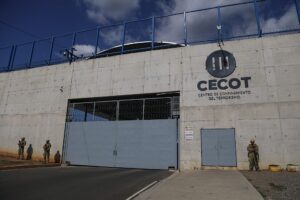In the context of serious human rights setbacks, the weakening of the rule of law, and the dismantling of institutional controls in El Salvador, the Legislative Assembly, controlled largely by President Bukele’s New Ideas party, passed a Foreign Agents Law without public debate.
The Law purports to promote “transparency” on the influence of foreign actors on public opinion and to safeguard security, national sovereignty, and the social and political stability of the country. However, the Law presents state authorities with an opportunity to control and sanction human rights groups and the media that have denounced corruption, human rights violations, and authoritarian practices by President Bukele. In doing so, the Law violates the rights to freedom of association, freedom of expression, press freedom, and the right to defend human rights. Similar laws have been used in Russia, Nicaragua, and Venezuela to control and neutralize independent organizations and media.
The Law requires individuals and organizations that receive funding internationally, directly or indirectly, to register as “foreign agents” with a newly established Foreign Agents Registry (RAEX) under the Ministry of the Interior. The law broadly defines foreign agents as any person or organization that “responds to interests, is controlled or financed, directly or indirectly by a foreign principal.” A foreign principal is any person or organization based abroad, including a government, political party, or organization, as well as any entity so determined by the RAEX. With a broad definition and discretion by the RAEX, the Registry may use this power arbitrarily.
Once registered, each financial transaction involving foreign principal funds is subject to a 30 percent tax. The Law does not clarify whether the current 10% tax on donations will be added to this new tax, which would further increase the financial burden and make it comparable to de facto confiscation, endangering the very existence and viability of organizations and independent media in the country.
Under vague and ambiguous terms, the Law prohibits the so-called foreign agents from conducting activities for political “or other” purposes that have the objective of altering public order or threatening the social and political stability of the country. These agents must use the funds for specific purposes outlined to the RAEX and cannot accept anonymous donations.
Among REAX’s broad powers, it can:
- Exempt certain organizations from the tax without establishing clear parameters. This may result in unequal treatment–rewarding or punishing entities depending on their relationship with the Government.
- Establish new requirements or obligations for foreign agents and new administrative procedures.
- Impose sanctions. In the case of a failure to register, the RAEX may freeze bank accounts, prevent the performance of activities, either temporarily or permanently, and suspend or cancel the legal status or registration of organizations. Failure to comply with the provisions of LEAX may also result in fines ranging from $100,000 to $250,000. Actions that result in fines or sanctions are not clearly enumerated, which could lead to an arbitrary imposition.
The Law opens the door to criminal prosecution through failure to comply with prohibitions and the Anti-Money Laundering law. It targets civil society organizations, especially those that advocate for human rights, and the media by attempting to control and limit activities perceived as threatening to the government.
Additionally, REAX’s extensive authority to supervise and regulate the activities of foreign agents, coupled with the law’s vague language and absence of clear legal definitions, creates significant risks of intrusive government interference in the operations of private entities. For instance, the power to revoke an NGO’s legal status without judicial oversight—based on vague grounds such as disturbing public order or threatening social and political stability—poses a grave threat to organizations that do not align with government interests. This provision could be exploited to target dissenting or independent organizations while bolstering those aligned with the authorities.
For these reasons, the undersigned organizations call on: 1) the Organization of American States (OAS) to condemn this legislation and convene an urgent permanent council to address the democratic backsliding in El Salvador; 2) the U.S. Congress to call on the Trump administration to abstain from supporting measures that undermine the work of civil society and human rights defenders; 3) the United Nations (UN) to condemn El Salvador’s Foreign Agents Law, and to urge the State to derogate the law and comply with its international obligations; and 4) the OAS and the UN to speak out against the proliferation of this type of legislation in the region and their negative impact on civil society.
- Acción Solidaria, Venezuela
- Alianza de Organizaciones por los Derechos Humanos del Ecuador
- Alianza Regional por la Libre Expresión e Información
- Amnesty International
- Asociación Pro Derechos Humanos APRODEH
- Center for Justice and International Law (CEJIL)
- Centro de Derechos Humanos de la Universidad Católica Andrés Bello (Venezuela)
- Centro de Documentación en Derechos Humanos “Segundo Montes Mozo SJ” (CSMM)
- Centro de Estudios Legales y Sociales (CELS)
- Consultoría para los Derechos Humanos y el Desplazamiento (CODHES)
- Convergencia por los Derechos Humanos Guatemala
- Corporación Humanas – Centro Regional de Derechos Humanos y Justicia de Género (Chile)
- Due Process of Law Foundation (DPLF)
- Equipo de Reflexión, Investigación y Comunicación (ERIC-SJ Honduras)
- Equipo Jurídico por los Derechos Humanos (EJDH)
- Fundación para la Libertad de Prensa (FLIP)
- Instituto de Defensa Legal – IDL, de Perú
- International Federation for Human Rights (FIDH), in the framework of the Observatory for the Protection of Human Rights Defenders
- International Institute on Race, Equality and Human Rights
- International Service for Human Rights (ISHR)
- Movimiento Autónomo de Mujeres, Nicaragua
- Paz y Esperanza, Perú
- Robert F. Kennedy Human Rights
- Tejiendo Redes Infancia en América Latina y el Caribe
- Washington Office on Latin America (WOLA)
- World Organisation Against Torture (OMCT), in the framework of the Observatory for the Protection of Human Rights Defenders



